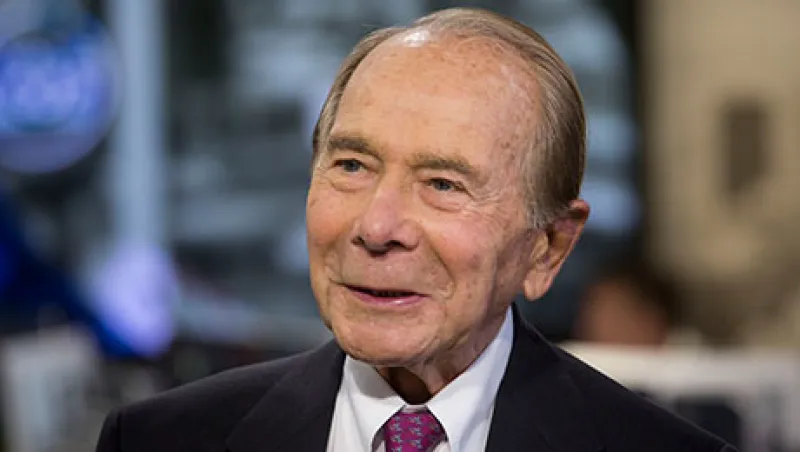Forget Starr International Co. v. the United States. Think Alien vs. Predator. The case Judge Thomas Wheeler ruled on last week, which pitted Starr chief Maurice (“Hank”) Greenberg, former longtime CEO of American International Group, against the U.S. government, had no good guys or even any winners, for that matter.
Greenberg claimed in the Starr suit that the government broke the law in September 2008 when it grabbed 79.9 percent of AIG in exchange for an $85 billion backstop by U.S. taxpayers. (That later grew to $182.3 billion.) At the time, the insurer was hemorrhaging billions of dollars from credit default swaps it wrote on collateralized debt obligations. A big holder of AIG stock at the time, Starr sought $40 billion in the class-action suit.
Judge Wheeler agreed with Greenberg that the government acted illegally by seizing control of the giant insurer. “[T]here is nothing in the Federal Reserve Act ... that would permit a Federal Reserve Bank to take over a private corporation and run it as if the Government were the owner,” he wrote in his ruling.
But the judge did not award Greenberg’s firm any of the money it had sought. Judge Wheeler pointed out that AIG stock would have been worthless in bankruptcy, which is where the insurance firm was headed without the bailout. You can’t expect damages if your only alternative is Chapter 11, the reasoning goes. “The firm’s value was below zero when this transaction occurred,” says James Cox, a professor at Duke Law School. “Any claim of loss was whimsical.”
Lawyers, journalists and investors struggled mightily to frame Judge Wheeler’s decision, without much success. That might just speak to the wisdom of the ruling.
For example, some called it a split decision. But plaintiff and defendant alike found it unsatisfactory — and are pushing back. Starr the next day said it would appeal the decision and later added that it will resurrect prior claims that had been dismissed.
For its part, the U.S. central bank issued an unusual critical statement. “The Federal Reserve strongly believes that its actions in the AIG rescue during the height of the financial crisis in 2008 were legal, proper and effective,” the bank wrote in a press release. The government, too, could appeal.
The bottom line is that neither the U.S. government nor Greenberg got what each sought at all — a free pass on back-door bailout of AIG’s bank counterparties in the former case and cash compensation in the latter.
The New York Times took the opportunity to argue in a front-page article that the ruling helped set a legal precedent, one that would prevent regulators from acting decisively in the next financial crisis. Others second the notion, but it’s probably wrong on two counts.
First, the Dodd-Frank Wall Street Reform and Consumer Act, enacted since the financial crisis, drastically overhauled the ground rules for bailouts of banks, insurers and others going forward. Title II of the act spells out with some precision how liquidations of systemically important financial institutions — including insurers — will be executed in the future. There’s a specific provision for how to proceed if a firm’s board doesn’t agree to be taken over, requiring a Washington court hearing. Presumably, AIG’s embattled board would have taken advantage of that.
Second, even if Judge Wheeler’s call did break new legal ground, it’s not clear that it would really matter in the future. After all, the government proved willing to break a law or assist in doing so in September 2008 because it suited the government. Judge Wheeler cited the New York Federal Reserve Bank’s own outside counsel, who said at the time, “The [government] is on thin ice and they know it.”
So, do precedents matter if the government pays them no heed? “To the extent that we had law, it was loathsomely ignored,” says Bartlett Naylor, a financial policy analyst at Public Citizen, a Washington-based advocacy group. “The case shed unflattering light on the ad hoc decision making during a perilous time.”
Last, both the Wall Street Journal and the New York Times described the decision by Judge Wheeler in the U.S. Court of Federal Claims in Washington as a “moral victory” for Greenberg. That would have been the case if Greenberg had been exonerated in some fashion. Yet the subject wasn’t even on the table.
Let’s all remember that it was Greenberg who in 1987 oversaw the creation of AIG Financial Products, the subsidiary that wrote the disastrous swaps that nearly sank the firm. It was under his watch that AIGFP first moved into the minefield of selling that protection on dubious collateralized debt obligations. And most important: It was Greenberg who handpicked the executives who ran AIG aground following his forced departure from the firm in 2005.
“Hank Greenberg wouldn’t know a moral victory if it bit him on his nose,” says Damon Silvers, former deputy chairman of the Congressional Oversight Panel, which investigated the AIG bailout. “Greenberg benefited from the bailout — but he wanted more, and didn’t get it.”
Of course, Judge Wheeler’s ruling does far more in highlighting the failings of the U.S. government under the pressure cooker of the financial crisis. “This is all about legacy,” says Silvers, now director of strategy and special counsel for the AFL-CIO labor union in Washington. “The government initially ran AIG for the benefit of its creditors and counterparties, instead of in the interest of the public — oddly enough, Greenberg’s demand that it should have been run for him makes the government look good.”







